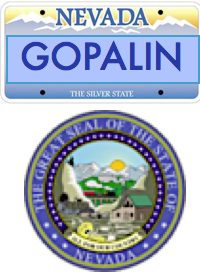
A Nevada man is suing the Department of Motor Vehicles after it denied his request for vanity license plates reading “GOPALIN,” alleging that the plates violate the standard against “vulgarity.” James Linlor, who requested the plates, is bringing the case for what he asserts to be political bias at the DMV. Requests for vanity plates are measured against a standard that indicates those plates cannot include a message that may be deemed to be “contempt, ridicule, or superiority of … political affiliation.” According to the Nevada DMV, “GOPALIN” is “vulgar” and “inappropriate.”
Linlor requested the same plates in 2009 and 2010, but both applications were denied, for the same reason. Later in 2010, Linlor requested a variation on the plates: either “Palin,” “Palin12,” or “Palin16.” Again, however, the DMV’s Special Plates Committee denied the request, contending they were inappropriate because of their political nature.
Linlor then requested a hearing before an administrative law judge, who reversed the DMV’s denial. According to the judge, the DMV does not maintain the right to deny requests simply because they are political.
Still, Linlor’s requests for “GO PALIN” plates continue to be denied, and he contends that the denials are politically driven.
When Linlor later requested personalized plates that read, “Go Obama,” the DMV complied. Likewise, he discovered that other requests for political plates have been accepted, including “GoGreen,” “DIMOCRAT,” “AL GORE,” “KERRY,” “EDWARDS,” “DEAN,” “HILLARY,” and (amazingly) “RONPAUL.”
However, requests for “REPBLICN” AND “BUSH” were rejected by the DMV.
On July 15, Linlor filed his complaint in the U.S. District Court in Nevada, which reads:
The actions of the DMV in selectively granting some “political” license plate requests while denying others are unconstitutional on grounds of content and viewpoint discrimination, and should be enjoined as a violation of the First and Fourteenth Amendments to the United States Constitution.
Linlor is seeking an injunctive relief from the DMV and the cost of his attorney’s fees.
Director of the Nevada DMV Bruce Breslow claims that he is confused as to the purpose of the lawsuit, saying a “GO PALIN” license plate was issued by the department on December 30, 2010. “I would not have denied [his request],” he added.
Breslow indicates, however, that the lawsuit is prompting him and the deputy director of the DMV to review its policy about personalized license plates and decide whether to approve such requests in the future. FairFax Underground observed that at issue in this lawsuit is whether the DMV will “alter is practices of using public policy to advance a particular political agenda,” and whether it will “give up abuse of their positions of authority to run up legal costs for anyone daring to challenge them.”
SarahPalinPlates.com — created by Linlor to track his long battle with the Nevada DMV — reports,
In what should be an obvious sign of the DMV’s fear of public awareness of their actions, the Nevada DMV has admitted under oath the inconsistency of their actions, and that they use a secret unelected committee to make decisions to ban personalized plates.
Last November, after a year-long legal fight in which it lost multiple court appeals, the DMV offered to issue the “GO PALIN” plates but refused to reconsider or alter their policy and revisit previously denied requests for conservative plates. This plan was not acceptable to Linlor, who insists that he would like to see the organization reverse its policy, because it violates civil rights and free speech. According to Linlor, accepting the DMV’s concession, which he says they offered simply because he refused to give up the fight, is “akin to if PG&E bought Erin Brockovich bottled water and let everyone else die.”
The website also makes note of a legal precedent:
The principles of Free Speech and Due Process as applied to personalized license plates have already been dealt with comprehensively in several cases, among them, the startlingly similar case of Lewis v. Wilson, 253 F.3d 1077 (2001) certiori denied, 535 U.S. 986, (2002), where the United States Court of Appeals for the Eighth Circuit found a Missouri law unconstitutional, on its face and as applied.” Id. 253 F.3d at 1082-83. The facts of the case merit consideration.
The DMV’s content based restriction, even if it were carried out uniformly, is presumptively unconstitutional, and the Supreme Court has indicated that a content or viewpoint-based restriction of private speech rarely, if ever, will withstand strict scrutiny review. See, e.g., R.A.V. v. St. Paul, 505 U.S. 377, 395-96 (1992).
Personalized plates are nothing more or less than the private, personal expression of the holder of the plate, i.e., private speech. See Confederate Veterans, 288 F.3d at 621; see also Perry v. McDonald, 280 F.3d at 166.
The Nevada State Attorney General’s office declined to provide representation for the Department of Motor Vehicles in their legal appeals.




